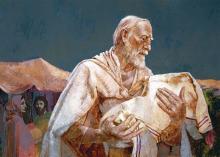Luke 19:9 This day is salvation come to this house, forsomuch as he also is a son of Abraham.
On this day, deliverance to the house, this one, comes into being so far as even he himself a son of Abraham is.
Much of the point of this verse is in the "he also" phrase, which is very unusual for a variety of reasons. The word translated as "is come" is not the word for "come" but the word for "become".
The Greek word translated as "this day" is an adverb that means "for today" and "on this day."
The word translated as "is...come" means "to become," that is, to enter into a new state. In Greek, especially as used by Jesus, it is the opposite of "being," which is existence in the current state.
The word translated as "salvation" means "deliverance", "preservation", "a way or means of safety", "keeping safe", "security", "safety," and "salvation." Salvation is more the sense of the Latin word than the Greek.
The "to" comes from the form of "this house" which is an indicated object.
The word translated as "this" means "from here" or "this/that thing."
The Greek word translated as "house," is any dwelling place but not exclusively a separate house. It means the household or clan that lives in the building as well. Jesus usually uses it in the later sense.
"Forsomuch as" is from an adverb that appears for the only in the Gospels here. Since adverbs are usually very common, this is unusual. Why this specific word?
The word translated as "he" is the Greek word commonly translated as third-person pronouns in English. The word means "the same" when used as an adjective. Its use as a subject is rare because this information is already part of the verb. It is used to emphasize the word, and, in this case, that word is further emphasized by the "also".
The Greek word translated as "also" is used as the conjunction "and", but it also is used to add emphasis "also", "even", and "just". Here, this word appears before the "he", which was added purposefully, so my sense is "even he".
The verb "is" here is the common form of "to be" in Greek. It means to have a certain characteristic or remain in a certain condition. It also equates terms or assigns characteristics. It doesn't appear in all versions so it may have been added to convert a spoken phrase into a written sentence.
The word translated as "son" more generally means "child" or "children". It can refer to all offspring in later generations, just like "father" refers to all previous generations. Jesus also used it metaphorically to describe those who follow a way of thought or set of beliefs that descend from an individual. More about it in this article.
"Abraham" is Abraam, which is the Greek form of "Abraham".
Σήμερον (adv) "This day" is semeron, which is an adverb that means "for today" and "on this day." --
σωτηρία [uncommon]( noun sg fem nom ) "Salvation" is from soteria, which means "deliverance", "preservation", "a way or means of safety", "keeping safe", "security", "safety," and "salvation."
τῷ οἴκῳ ( noun sg masc dat ) "House" is oikos, which means "house", "dwelling place", "room", "home", "meeting hall", "household goods", "substance," and "ruling family." It is any dwelling place but not exclusively a separate house.
τούτῳ ( adj sg masc dat ) "this" is touto, which means "from here", "from there", "this [thing]," or "that [thing]."
ἐγένετο, ( verb 3rd sg aor ind mid ) "Is" is ginomai, which means "to become", "to come into being", "to happen", "to be produced," and "to be." It means changing into a new state of being. It is the complementary opposite of the verb "to be" (eimi)which indicates existence in the same state.
καθότι [unique]( adv ) "Forsomuch as" is from kathoti, that means " in what manner. "so far as", and "inasmuch as"
καὶ (conj/adv) "Also" is kai, which is the conjunction joining phrases and clauses, "and," or "but." After words implying sameness, "as" (the same opinion as you). Used in series, joins positive with negative "Not only...but also." Also used to give emphasis, "even", "also," and "just."
αὐτὸς (adj sg masc nom) "He" is autos, which means "the same," and the reflexive pronouns, "myself", "yourself", "himself", "herself", "itself," or the oblique case of the pronouns, "him", "her," and "it." It also means "one's true self," that is, "the soul" as opposed to the body and "of one's own accord." In the adverbial form, it means "just here" or "exactly there."
υἱὸς (noun sg masc nom) "The Son" is huios, which means a "son," and more generally, a "child." It is used generally to refer to any male descendant. --
Ἀβραάμ (Hebrew name) "Abraham" is Abraam, which is the Greek form of "Abraham."
[ἐστιν] (verb 3rd sg pres ind act) "Is" is eimi, which means "to be", "to exist", "to be the case," of circumstance and events "to happen", and "is possible." (The future form is esomai. The 3rd person present indicative is "esti.")

